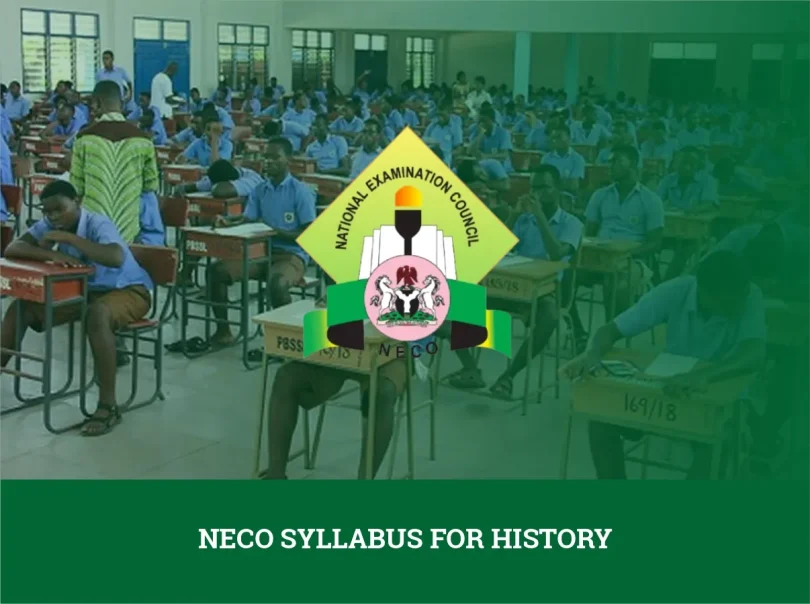If you are preparing for the NECO History exam, having the right syllabus is your best starting point. History isn’t just about memorizing dates, it’s about understanding the roots of societies, how events unfolded over time, and how they shape the world today.
The NECO History syllabus gives you a clear map of what topics to study, from ancient civilizations to post-independence Nigeria and West Africa’s place in the wider world.
If you have yet to access the NECO Syllabus for History, read this post to the end to see the full syllabus and use it for your revision.
NECO Syllabus For History
Section A: West Africa and the Wider World from Earliest Times to 2000
Historiography and Historical Skills
- Definition and importance of history.
- Sources of history: oral traditions, written records, archaeology, etc.
- Historical skills: critical analysis, interpretation, and evaluation.
- Prospects of ICT in historical studies.
Trans-Saharan Trade
- Origin and organization of the trade.
- Effects on the development of West African states.
Islam in West Africa
- Introduction, spread, and effects on West African societies.
European Contact with West Africa
- Reasons for European exploration and contact.
- Immediate effects and West African reactions.
Trans-Atlantic Slave Trade
- Origin, organization, and suppression.
- Effects on West Africa.
Christian Missionary Activities in West Africa
- Suppression of the slave trade.
- Missionary activities and their impact on West Africa.
The Scramble for and Partition of West Africa
- Industrial Revolution and the scramble for colonies.
- Colonial subjugation, occupation, and West African reactions.
Colonial Rule in West Africa
- Patterns of colonial rule.
- Consolidation of European culture in Africa.
- Colonial economy and underdevelopment.
- Colonial Africa and the two World Wars.
Problems of Independent West African States
- Nature of politics: neo-colonialism and economic underdevelopment.
- Unequal development within states and instability.
- Military in West African politics.
- Boundary disputes and threats to West African unity.
West Africa and International Organizations
- United Nations Organization (UNO)/United Nations (UN).
- Organization of African Unity (OAU)/African Union (AU).
- Economic Community of West African States (ECOWAS).
- Membership, aims and objectives, achievements, and failures.
Nigeria from Earliest Times to 1800
Historiography and Historical Skills
- Definition and importance of history.
- Sources of history: oral traditions, written records, archaeology, etc.
- Historical skills: critical analysis, interpretation, and evaluation.
- Prospects of ICT in historical studies.
Land and Peoples of Nigeria
- Main geographical zones in Nigeria.
- Impact of the environment on human activities: hunting, fishing, farming, etc.
Centers of Ancient Civilization
- Nok, Ife, Igbo Ukwu, Benin
Centralized and Non-Centralized States
Centralized States:
- Kanem and Borno.
- Hausa.
- Nupe.
- Oyo.
- Benin.
Non-Centralized States:
- Igbo.
- Efik.
- Tiv.
Section C: Nigeria from 1800 to 2000
The Sokoto Caliphate
- Establishment and administration.
- Impact on Nigerian society.
Christian Missionary Activities
- Introduction and spread of Christianity.
- Impact on education and social life.
British Conquest and Occupation
- Methods of conquest: diplomacy, warfare, treaties.
- Establishment of colonial rule.
Colonial Economy
- Currency, taxation, and forced labor.
- Infrastructure: transportation, post, and telecommunication.
- Agriculture, mining, industry, commerce, and banking.
Social Development under Colonial Rule
- Western education.
- Urbanization and social integration.
- Improvement unions and health institutions.
Nationalism, Constitutional Developments, and Independence
- Rise of nationalist movements.
- Constitutional developments: Clifford (1922), Richards (1946), Macpherson (1951), Lyttleton (1954).
- Constitutional conferences: Lagos (1957), London (1958).
- General elections of 1959 and independence in 1960.
Post-Independence Nigeria
- Political developments: military coups, civil war, return to civilian rule.
- Economic and social challenges.
- Nigeria’s role in international organizations.
To succeed in your NECO History exam, be sure to use the recommended reading materials and practice past questions alongside the topics outlined in NECO Syllabus for History. This approach will help you understand the content better and increase your chances of passing. If you have any questions, feel free to ask in the comments section; we are here to help. Also, remember to check our page for syllabi on other NECO subjects.







Leave a Comment